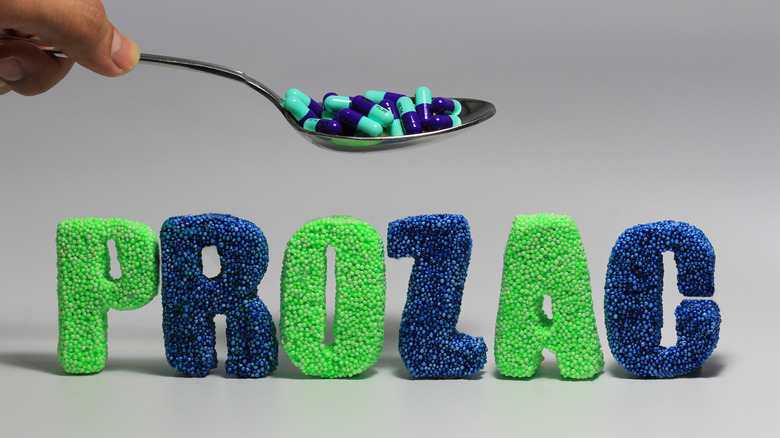This Is How Long It Takes For Prozac To Start Working
Prozac is a generic name for fluoxetine, a selective serotonin reuptake inhibitor (SSRI). It works as an antidepressant that triggers the brain's neurotransmitters, helping people to manage various mental health conditions (via Drugs.com). Data from the Food & Drug Administration (FDA) shows that fluoxetine was approved as a treatment for depression in 1987 under the brand name Prozac. As of the year 2000, the drug was used by an estimated 28 million (or 1 in 10) Americans, according to WebMD.
According to Johns Hopkins Medicine, 1 in 4 adults in the United States have a diagnosable mental condition. While various treatment options exist, research suggests that antidepressants can be a top and effective choice, according to the NHS.
A 1986 study published in the journal Drugs notes that as an SSRI, Prozac enhances serotoninergic neurotransmission, which offers significant therapeutic benefits to people with bipolar. Despite Prozac's demonstrated efficacy, Mayo Clinic notes that the drug, like most antidepressants, may not work on the same level for everyone. If you've been prescribed the drug and are curious about how long Prozac takes to work, this further explains the onset of action and specific Prozac side effects to look out for.
How long does it take for Prozac to start working?
After a series of tests, a 2013 study published in the journal Neuropsychiatric Disease and Treatment concludes that users of Prozac can experience a rapid onset of action in 1 or 2 weeks. However, the NHS believes that the drug needs about 1 week to build fluoxetine levels in the body and a few more weeks for the body to adapt. So it can take 4 to 6 weeks for the full benefits of Prozac to actualize, per the NHS. If you don't see the desired effects of Prozac, it could be due to various factors, including wrong administration. Your doctor is the best person to explain the exact cause.
It's important to stick to your doctor's dosage instructions and refrain from overdosing. According to the National Alliance on Mental Illness, overdosing on Prozac might lead to a medical emergency. While your doctor is the best person to determine the right dosage, the alliance suggests that the dose usually ranges between 20 and 80 mg, or 90 mg for those taking Prozac once weekly. WebMD also advises using medically recommended measuring devices or spoons when administering Prozac in liquid form, so as not to overdose.
Common side effects of Prozac
According to Healthline, Prozac use might lead to various side effects depending on factors such as age, underlying medical conditions, and drug interaction with other medications. Some mild side effects can include body weakness, nausea, diarrhea, indigestion, or loss of appetite, per Healthline. Other mild side effects include dry mouth, throat irritations, excessive yawning, and flu-like symptoms, according to WebMD. More severe side effects include serotonin syndrome, hypomania, and a decrease in blood salt levels, per Medical News Today.
Drugs.com also says that fluoxetine can also cause drowsiness. So it would be best to avoid activities that require alertness, like driving. According to Harvard Medical School, people taking Prozac might also experience a reduction in their sex drive and might have difficulty reaching an orgasm. In general, side effects might also stem from underlying medical conditions. The earlier you talk to your doctor, the better your chances of finding a solution. It's also important to speak to your doctor about possible Prozac withdrawal symptoms that may arise once you stop the medication.



